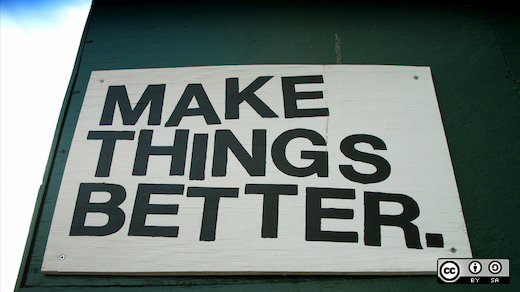One of the great things about open source is its reach beyond just the software we use. Open source isn’t just about taking principled stands, it's about making things better for the world around us. It helps spread new ideas by letting anyone with an interest modify and replicate those ideas in their own communities.
In this collection, let’s take a look back at some of the best articles we’ve shared this year about the ways that open source is making an impact on communities and improving the lives of people across the world.
Asian Penguins middle school Linux club inspires community
by Stu Keroff
The Asian Penguins are a student club at the Community School of Excellence (CSE), a Hmong charter school at the north end of Saint Paul, Minnesota. The group started as an informal after school group of students who were interested in learning more about how computers work, and grew into the defacto IT support group within the school. But they are so much more than that. The Asian Penguins took their Linux skills and applied them to "mission" trips, helping low income families by refurbishing old computers with Linux and training the families on how to use them to accomplish everyday tasks.
WhiteBikes gets start in Slovakia, dreams of a city near you
by Daniel Duris
Plenty of cities around the world are starting to invest in bike sharing systems to help residents commute on a mode that is easier, healthier, and cheaper than automobiles, while at the same time easing congestion and helping the environment. WhiteBikes took this model a step further by developing a system for helping people to find bikes and help program managers keep track of inventory, all with the use of open source software.
Odia language Wikipedia page grows to 800K page views a month
by Subhashish Panigrahi
Learn about one of the many projects within Wikipedia to bring open knowledge to people in their own languages. Many of us English-speakers take it for granted that when we want to learn something, there are a glut of resources available to us. But for many who speak other languages, finding information on the Internet can be a challenge. Here's how one group is working to change that.
OpenStreetMap responds in Nepal
by Andrew Wiseman & Pierre Béland
In April and May of this year, the mountainous country of Nepal suffered a series of devastating earthquakes which killed thousands and left many more injured, homeless, and picking up the pieces of their lives. But Nepal's geographic isolation didn't prevent these volunteers from helping in relief efforts. By participating in the Humanitarian OpenStreetMap Team (HOT), these geographic heroes helped relief organizations with planning, logistics, and identifying needs by using open data and open source tools to provide much-needed information.
Building better assistive technology with open hardware
by Spencer Hunley
Technology has the ability to make everyone's life better, assisting us in our day-to-day tasks. But for many people with disabilities, technology does more than that, enabling them to do many of the things the rest of us take for granted. While assistive technology has come a long way in recent years, much of it is still closed source and slow to change. Here's how open hardware is helping to make assistive technology more accessible than ever to those in need.
Forking Bach: Opening classical music to remixes
by Robert Douglass
Classical music is still heard around the world today thanks to the countless musicians who help keep it alive through performance. But despite much of the work of a bygone era now existing in the public domain, scores can be hard to come by, and sharing modifications can be difficult. Thanks to the Open Well-Tempered Clavier, Bach's music is now preserved and accessible for anyone to use and modify.
An open source tool for producing and balancing energy
by Sander Jansen
As the world seeks to move past its over-reliance on fossil fuels and more towards a more renewable and distributed model of energy production in the future, with residential solar popping up on rooftops across the globe, consumers are quickly also becoming energy producers. PowerMatch attempts to address many of the issues with decentralized energy production with open source software for creating smart grids to power our future.
Certainly, this list isn't exhaustive. Which story was your favorite? What did we miss? And what stories should we cover next? If you know of a way in which open source principles are being used in a way to improve the world around us, propose our next article!
And if you're asking yourself, "What can I do to help the world with open source?" why not check out this great list of eleven ways to get involved with Humaritarian Free and Open Source Software (HFOSS).







4 Comments